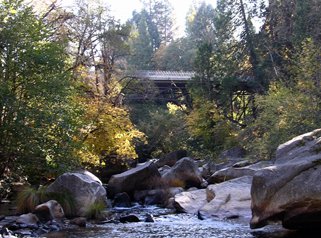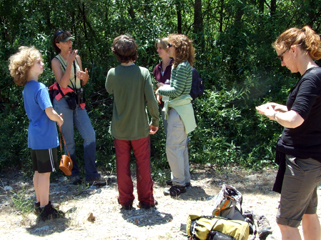In 1995, a group of citizens living in the Deer Creek watershed became volunteer monitors for the city of Nevada City during the demolition and reconstruction of the Pine Street bridge. Seeing the need for continuing water quality monitoring and restoration beyond the life of the construction project, these citizen-monitors organized themselves as Friends of Deer Creek. In 1999-2000 the group filed for and received its non-profit corporation status.
In 2000, Friends of Deer Creek received a state grant of $195,000 to initiate baseline water quality monitoring, restore Little Deer Creek in Pioneer Park, perform a Disturbance Inventory, and develop a Coordinated Resource Management Plan (CRMP). This grant funding allowed us to hire our first paid staff member, biologist and executive director Joanne Hild. In 2003 the grant was extended for a year with an additional $60,000, to assist in the development of a laboratory to study bacteria, algae, macroinvertebrates, and nutrients. Friends of Deer Creek became one of a handful of non-profit organizations nationwide to develop a citizen-based macroinvertebrate monitoring program.
With further grant funding from a wide range of state, federal, and private funders, Friends of Deer Creek expanded its capacity to include salmon habitat restoration, trail development, heavy metal study and remediation, riparian revegetation, education, and a comprehensive monitoring and assessment program throughout the watershed. We created a macroinvertebrate identification manual that is in use nationwide, and completed a watershed-wide restoration plan.
The success of our citizen-based scientific monitoring and restoration program, with its ten years of rigorous data collection and numerous completed projects, led to the decision to reorganize as Sierra Streams Institute in order to expand regional capacity. With a new mission to assist other groups engaged in similar work, we moved in August 2010 to a larger facility that includes a classroom and expanded laboratory. We now offer trainings, education, and laboratory services to individuals, groups, and agencies.

Where it all began: The Pine Street bridge as seen from the creek.






















